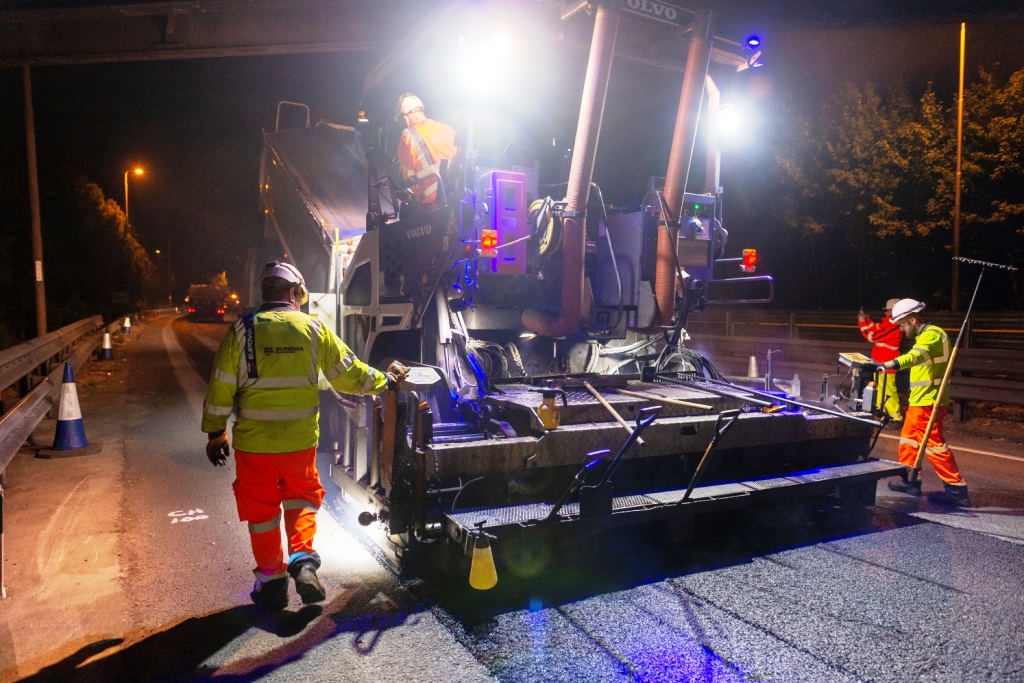Gipave is a polymeric additive for asphalt that contains graphene, the stronger-than-steel, carbon-based wonder-material .
The material was developed in Italy by asphalt producer Iterchimica and graphene technology specialist Directa Plus.
Over the past five years Gipave has been trialled in the UK on local authority roads in Oxfordshire, Kent, Staffordshire and Essex. In 2019 it was considered for use on the M25, with discussions between contractor Skanska and Connect Plus, National Highways’ managing agent for the M25, but these talks came to nothing.
Now, however, National Highways has finally decided to give Gipave a try.
Last month Gipave was used to resurface 1km of the A12 trunk road, northbound between Hatfield Peverel and Witham in Essex, using 40% reclaimed asphalt.
Studies have shown that while using Gipave increases the upfront costs, whole life costs are reduced by 32% because it makes the road surface last longer.
The performance of the material on the A12 will be monitored over several years to see how it performs.
This trial is part of a National Highways research project under SPaTS 2, which is testing several emerging, low carbon asphalt products. The trial is adopting both hot and warm mix technologies for comparison studies. It is being conducted with the help of industry partners Eurovia, Jean Lefebvre (UK), AtkinsRéalis, Iterchimica and Directa Plus.
Contractor for the A12 trial is Eurovia UK with support from specialist Jean Lefebvre UK for the mix design. Consulting engineer AtkinsRéalis is monitoring the performance of the Gipave-enhanced asphalt, measuring it against a control section of standard polymer-modified bitumen asphalt.
The trial is being coordinated by an AtkinsRéalis-Jacobs joint venture as part of a National Highways research project which University of Nottingham and Jean Lefebvre UK will support with the lab testing.


While this is National Highways’ first use of Gipave, it is not its first dalliance with graphene. In autumn 2021 it repaved three miles of the A1 northbound carriageway between Newton on the Moor and West Cawledge in Northumberland with a recycled asphalt mix that had ‘raw’ graphene added to it. That trial is by the Graphene Engineering Innovation Centre (GEIC) at the University of Manchester and Pavement Testing Services (PTS).
Umesh Parajuli, the A12 project sponsor and senior pavement advisor at National Highways, said: “We are constantly exploring new ways to improve our road network with a focus on three imperatives: safety, the customer and delivery. It’s encouraging to move innovative road materials from the lab to the real world, as they promise more durability and efficiency, while maintaining road user safety and lowering carbon emissions. This trial of graphene-enhanced asphalt supports our 2040 net zero target for construction and maintenance and could provide significant whole-life benefits, improving the service life of both local and national networks.”


AtkinsRéalis technical director for transportation, Michael Wright, said: “The trial of graphene-enhanced asphalt marks a step towards more advanced road construction in the UK and builds on our work with National Highways to trial emerging technologies. We will closely analyse the performance of this innovative product, which could lead to significant improvements in road durability and reduce environmental impact through a new, sustainable circular economy.”
Directa Plus chief executive Giulio Cesareo said: “The continued use of Gipave demonstrates the growing recognition of its ability to improve road durability and sustainability, aligning with our mission to deliver cutting-edge, eco-friendly solutions to the infrastructure sector.”

